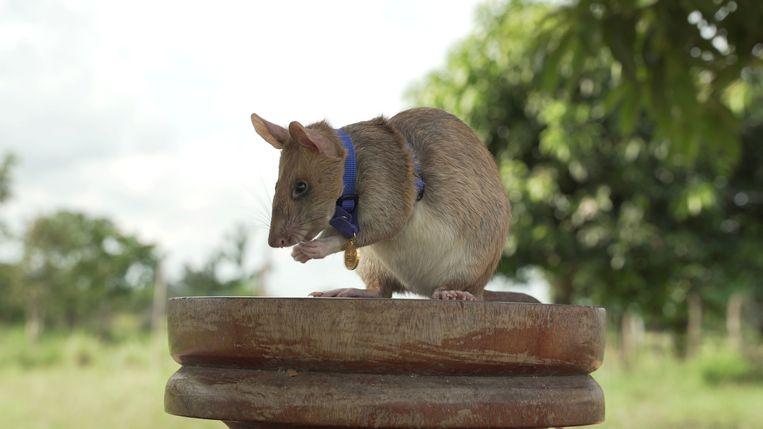Meet Magawa, a bomb-shedding rat, and what a one. Magawa has already discovered and designated so many landmines that formal recognition for his important detective work could not fail. The rodent has now received the highest award for animals: the ‘PDSA Gold Medal’.
Mine sniffer Magawa (7), born and trained in Tanzania, is a bomb expert to tell you the truth. In 30 minutes, the African hamster rat can tell you if there is a landmine somewhere in an area the size of a tennis court. A feat that takes a man with a metal detector up to four days. Magawa works in Siem Reap in Cambodia, which is the second most mine-affected country in the world after Afghanistan.
Dozens of finds
In total, Magawa has found 39 landmines and 28 pieces of unexploded war munitions during his career – he is nearing retirement. With his sharp nose, he has also searched more than 141,000 square meters of land and declared it safe, that is, at least 20 football fields.
Incidentally, there is a striking touch to the hero story of Magawa. The hamster rat was trained by the Tanzania-based Belgian NGO APOPO, an organization specialized in training rats to detect landmines and tuberculosis in humans.
The organization was created when Belgian Bart Weetjens was looking for a solution to the global problem of landmines in the 1990s. Or the rodents he loved as much as maybe pets could be used? Yes! And so the idea behind APOPO was born, and the story took shape.
Award
So many years later, Magawa is today the most successful recruit – or ‘HeroRAT’ as the organization calls their rats – of all. At 1.2 kilos in weight and 70 centimeters in height, the sniffing king received recognition this week for his hard work in the form of the prestigious PDSA gold medal, an award from the British animal organization for animal bravery and courage of the same name.
The medal is, so to speak, the animal equivalent of the British military ‘George Cross Medal’; the highest tribute ‘for acts of the greatest heroism or the most outstanding courage in conditions of extreme danger’.
Magawa is the first rat in APOPO’s 77-year history to be awarded the award. He received a tiny gold medal in a virtual ceremony. “This is a great honor for us,” said Christophe Cox, APOPO CEO to Press Association.
“Especially for our trainers, who get up early every day to work with the animals in the morning. But this is also a great event for all the people of Cambodia and everyone around the world suffering from landmines. This medal draws attention to the problem of landmines worldwide.”
Intelligent
Cox adds that rats are highly intelligent, have incredible noses, and are better than other animals at performing repetitive tasks in exchange for food rewards. Due to their size and lightweight, they are also much less at risk than other animals when they venture into minefields. They are too light to trigger the mines.
After a year of training, the rats become certified mine sniffers. Half an hour a day, always in the early hours, they search for explosives. When they detect one, they scratch the top to alert their human companions.
TNT
But how, then, do they find the mines, right? Well, the rats have been trained to specifically detect TNT’s chemical compounds inside landmines and other explosive remnants of war. Because they draw their attention to them, they ignore pieces of metal lying around and therefore work much faster and more efficiently than any metal detector.
‘Extraordinary work’
Magawa is the first rat of all 30 animals that have now received the award.
“The work of Magawa and APOPO is unique and extraordinary,” said PDSA Director General Jan McLoughlin. “Cambodia estimates that between four and six million landmines were laid in the country between 1975 and 1998, unfortunately resulting in at least 64,000 casualties.” Cambodia also has the highest number of mine amputations in the world.
“Magawa’s work saves human lives and changes the lives of all men, women, and children affected by landmines. Every discovery he makes reduces the risk of injury or death for the local population. We are delighted to present him with this award.”
